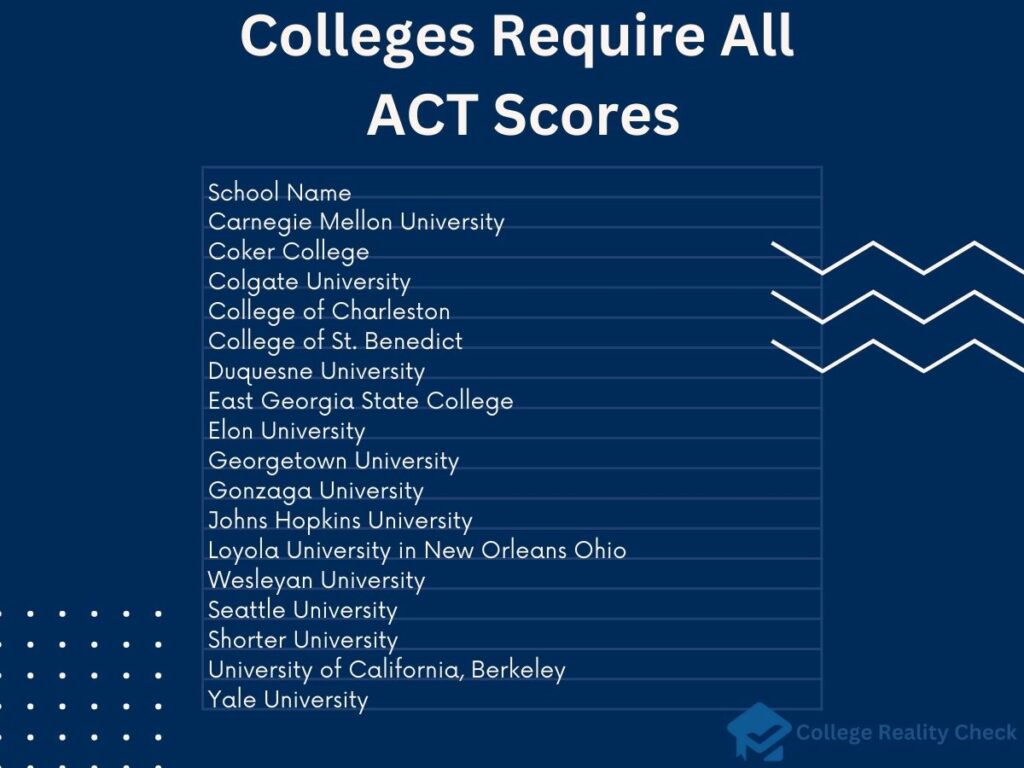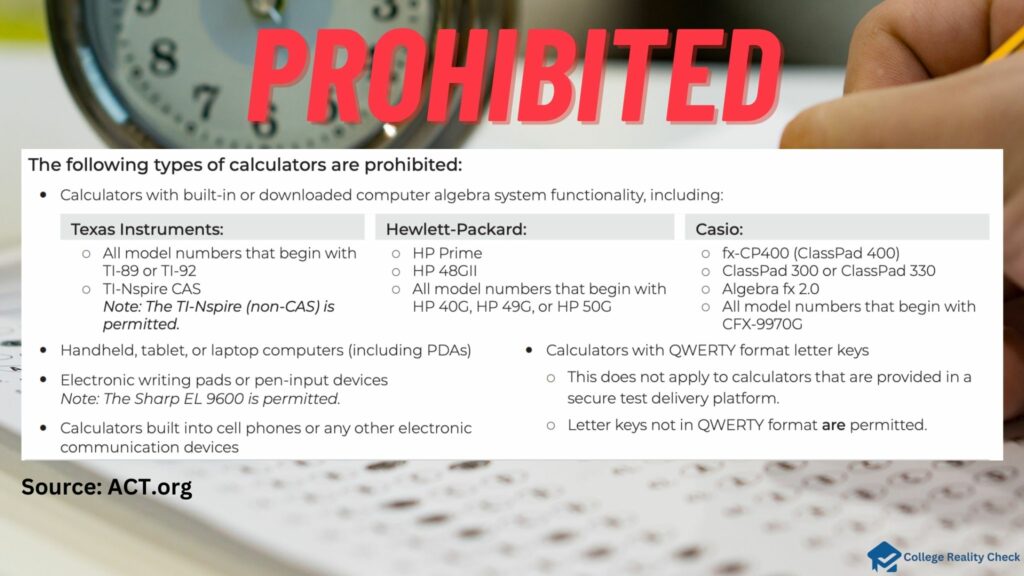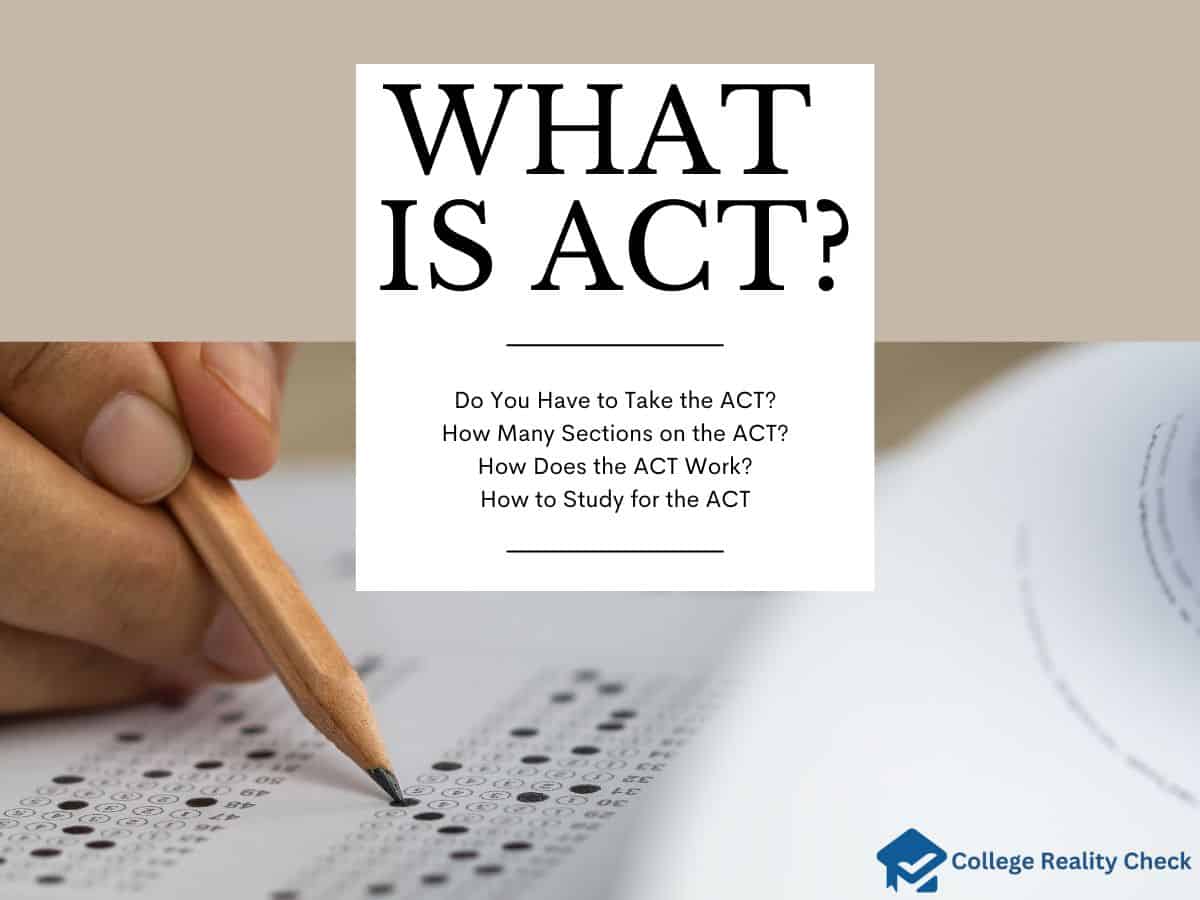ACT: All You Need to Know to Pass the Test
Formerly standing for American College Test, the ACT is a college entrance exam that high school students usually take in their junior year in preparation for the college application season.
The ACT is a standardized test used by some postsecondary institutions as an entrance exam. It is designed to measure a student’s college readiness, which is necessary for academic success in the pursuit of a bachelor’s degree. The ACT is administered to around 1.3 million high school teens every year.
If you are a high schooler who is preparing for your college career, continue reading this post.
Is the ACT Important for College Admissions?
When applying to colleges with a test-required admissions policy, the ACT serves as one of those college admissions tests.
As a matter of fact, it may still be a good idea to take it when applying to test-optional colleges as test scores sometimes serve as a tie-breaker between 2 equally promising applicants or increase the appeal of an otherwise mediocre application.
The only time the ACT is critical in the college admissions process is if the high school teener is planning on applying to test-required colleges where the submission of test scores is mandatory.
Do You Have to Take the ACT?
Taking the ACT is a must if students are attending high schools where sitting for the said standardized test score is a requirement for graduation. Students who are applying to test-required colleges must also take the ACT or the SAT. Otherwise, it’s up to the high schooler completely whether or not he will register for the ACT.
As far as applying to test-optional colleges goes, college-bound students should determine whether taking the ACT could help increase their admissions chances by demonstrating their readiness for higher education.
Read Also: 13 College Entrance Exams And When To Take Them
Can Colleges See How Many Times You Took the ACT?
Colleges and universities cannot see how many times an applicant took the ACT. The only time their admissions officers can have an idea of how many times an aspirant sat for the ACT is by means of the number of scores that he or she will submit. It’s important to note, however, that some institutions require applicants to submit all ACT scores.

The picture above contains a list of some colleges that require the reporting of all ACT scores from all test dates.
What is on the ACT?
Based on the ACT website itself, the ACT consists of 4 tests, each one having multiple-choice questions. There are a total of 215 questions, with 1 additional essay prompt for test-takers who opt to take the Writing section, which is optional.
How Many Sections are on the ACT?
The 4 sections of the ACT are English, Math, Reading and Science sections. Among the said sections, the English section has the most number of questions, although the Math section has the longest allotted time for completion. On the other hand, both the Reading and Science sections have the same number of questions and length of time.
As mentioned earlier, there is an optional Writing section that students may or may not choose to take.
How Many Questions is the ACT?
The ACT has a total number of questions amounting to 215. Among the various sections, the English section has the most number of questions (75). Both the Reading section and the Science section, meanwhile, have the least number of questions (40). All questions are multiple-choice questions, with the exception of the optional Writing section.
Here’s a table that shows the number of questions each section of the ACT has:
| Section | Number of Questions |
| English | 75 |
| Math | 60 |
| Reading | 40 |
| Science | 40 |
| Writing | 1 |
What Kind of Math is on the ACT?
According to ACT itself, the Math section of the ACT covers math topics that can be grouped into the following categories: number and quantity, algebra, functions, geometry, and statistics and probability. Of all the various sections of the ACT, it’s the Math section that takes the longest to complete — test-takers are given a total of 60 minutes to do so.
Let’s take a quick look at the various components of the ACT’s Math section:
- Number and quantity – knowledge of real and complex number systems
- Algebra – use of linear, polynomial, radical and other equations
- Functions – knowledge of function definition, notation, representation, and application
- Geometry – knowledge of shapes and solids as well as composition of objects
- Statistics and probability – application and analysis of data collection methods and others
Is There Science on the ACT?
Unlike the SAT, the ACT has a Science section. The said section is 35 minutes long and, as mentioned earlier, consists of a total of 40 questions. There are several passages on actual scientific scenarios, each of them followed by multiple-choice questions.
Needless to say, the Science section of the ACT can be hard for students who are unfamiliar with the scientific method.
It’s also important for test-takers to have strong reading and comprehension skills to ace the ACT’s Science section.
Is There Writing on the ACT?
There is a Writing section of the ACT. Since it’s an optional section, however, students who are sitting for the ACT may or may not opt to undergo it. The optional Writing section is given after all the other sections of the ACT. There is only 1 essay prompt available, which describes a general issue and is presented in 3 different perspectives.
Students who choose to take the Writing section need not have any special knowledge or experience to answer it.
What is the ACT Science Reasoning Test?
The ACT Science Reasoning Test, simply put, is the official name of the Science section of the ACT. This particular area of the college entrance examination is designed to assess the ability of test-takers to understand scientific information and interpret data as well as put them into application.
Some of the topics covered include biology, chemistry and physics.
Something that the ACT has that the SAT doesn’t is a Science section. It’s for this reason why some high school students who are very good in hard and soft science may prefer taking the ACT rather than the SAT.
How Does the ACT Work?
The ACT is a standardized test that consists of 4 sections and 1 optional Writing section. It consists of 215 multiple-choice questions and 1 essay prompt in the Writing section. Test-takers are given a total of 2 hours and 55 minutes to complete the entire test, with an additional 40 minutes for students who choose to take the Writing section.
What Does the ACT Measure?
The ACT is designed to measure skills that are of utmost importance for success in postsecondary education as well as honed as students work on their respective college degrees. In the college admissions process, the ACT is used by admissions officers to determine just how ready an applicant is to take on college-level coursework.
Especially where a holistic review is practiced, the ACT is not the only factor considered when deciding whether or not an applicant should be accepted. Similarly, the ACT has zero influence on admissions at test-blind institutions.
Is the ACT Multiple Choice
The ACT consists of multiple-choice questions. Each question comes with 4 or 5 answer options that test-takers can choose from. On the other hand, the SAT has some write-in questions that require a response from the students, particularly in the Math section, although the vast majority of SAT questions are multiple-choice kinds.
Of course, the optional Writing section of the ACT requires test-takers to provide an answer rather than choose it.
Is ACT a Standardized Test?
The ACT is a standardized test given that all students from various high schools need to answer the same questions. In addition, they are graded in a similar manner, using a scale score that goes from 1 to 36.
However, institutions of higher education that include the ACT in the admissions process may see ACT scores differently.
Because both the ACT and SAT are standardized tests that measure pretty much the same knowledge and skills among college-bound high schoolers, both are accepted by colleges — one is not preferred over the other.
When Do You Take the ACT Test?
Most high schoolers take the ACT for the very first time in the spring of their junior year. Such is the recommendation as some of the topics in the Math section of the ACT are not covered until that time. Students who find it necessary to retake the ACT commonly do so in the fall of their senior year of high school.
The ACT is administered 7 times a year: September, October, December, February, April, June and July. The standardized test score can be taken by a student only 12 times.
How to Guess on the ACT
Using the process of elimination is the best way to guess on the ACT. This entails looking for the wrong answers instead of the correct ones. Spotting 2 incorrect answers and getting rid of them increases a student’s chance of answering correctly by as much as 50% if there are 4 answer options and by as much as 60% if there are 5 answer options.
On the ACT, answering incorrectly will not cause a test-taker to face a point-deduction penalty. This is why he or she should make a guess instead of leaving a question unanswered when absolutely clueless.
How Long is the ACT?
The ACT takes 2 hours and 55 minutes to complete. The optional Writing section, meanwhile, is 40 minutes long, which means that students who opt to take it will take 3 hours and 35 minutes to complete the standardized test. There is a 10-minute break between the Math (2nd test) and the Reading (3rd test) sections and a 5-minute break before the Writing section.
Here’s a table showing the length of each section of the ACT:
| Section | Time |
| English | 45 minutes |
| Math | 60 minutes |
| Reading | 35 minutes |
| Science | 35 minutes |
| Writing | 40 minutes |
How Does ACT Scoring Work?
Test-takers get a point for every correct answer — there is no penalty in the form of a point deduction for guessing or getting the wrong answer. The total number of questions answered correctly on all sections of the ACT is the raw score of the student. Afterward, the said raw score is converted into a scale score that ranges from 1 to 36.
In scoring the optional Writing section, 2 individuals evaluate the work, giving it a combined score on a scale of 2 to 12.
What is a Good ACT Score?
Generally speaking, a good ACT score is any score that’s better than the scores of 75% of all test-takers. This means that the score is in the top 25th percentile. However, a score above the median score is also considered a good score.
Just about any ACT composite score that’s similar to the scores of students admitted to one’s top-choice school is good as well.
Facts About the ACT
The ACT costs $68, which includes everything from the examination to the score reports. On the other hand, taking the optional Writing section causes the cost of the ACT to increase to $93.
Let’s talk about a few other facts every student looking to take the ACT might want to know about.
History of the ACT
It was in 1959 when the ACT was first administered. Prior to the said date, the SAT was the only standardized test used by many colleges and universities as an entrance exam. The ACT came into being as more and more colleges were established and more and more students wanted to pursue higher education.
Since the ACT was established, the non-profit organization that created it expanded its services and programs. For instance, it also offered training and assessment services that go past the college admissions realm.
In 2005, in the same year that the SAT came up with a mandatory Essay section, the ACT introduced a Writing section.
While the SAT made the Essay section optional in 2016 and abolished it altogether in 2021, the Writing section of the ACT is still around, and test-takers may still choose to take it or not.
Who Created the ACT?
While the ACT is created by ACT, which shares the name with the standardized test, it’s designed by Everett Franklin Lindquist. An education professor at the University of Iowa, Lindquist created the ACT based on personal achievement and practical reasoning.
Needless to say, the ACT was created to become a direct competitor to the SAT.
Originally, Lindquist included a Social Studies section in the ACT. However, in 1989, the said section was replaced by the Reading section, which included a social studies component.
What is ACT, Inc.?
ACT, Inc., which is also oftentimes simply referred to as ACT, is the creator and administrator of the ACT, the standardized test. It was founded in 1959 in Iowa the same year that the college entrance exam was created. ACT, Inc. was co-founded by the designer of the ACT himself, Everett Franklin Lindquist.
How Many People Take the ACT?
Almost 1.3 million students took the ACT in 2022, according to a US News report. In the same year, 1.7 million students took the SAT, which makes it more popular than the ACT. In 2021, based on another report by Forbes, the number of students who sat for the standardized test declined by 22% from the previous year.
Despite the fact that fewer students take the ACT than the SAT, colleges have no preference between them.
What is the ACT Designed to Predict?
The ACT is a standardized test designed to predict a student’s ability to reap academic success in college. That’s because it’s composed of questions that establish their skill levels in areas that are integral components of college-level coursework.
Some of the skills measured by the ACT are especially important for introductory courses.
However, some research says that the GPA is a much better predictor of college success than the ACT or SAT.
Is the Fifth Section on the ACT Scored?
The fifth section of the ACT isn’t scored. So, in other words, a test-taker’s score in the said section will not affect his or her ACT composite score. Similar to the fifth section of the SAT, the ACT’s fifth section is made up of experimental questions in English, reading, math and/or science designed to determine which new content and questions would work.
Recently, the fifth section of the ACT is given to students who opt not to take the optional Writing section.
Does the ACT Have an Essay?
The ACT has an essay section, which is referred to as the Writing section. As the name suggests, the said 40-minute section of the college entrance exam is designed to measure a test-taker’s ability to write. The Essay portion of the SAT, meanwhile, became optional in 2016 and then completely removed by the College Board in 2021.
Even though the ACT’s Writing section is optional, The Princeton Review report says that 27 colleges require it.
Does the ACT Provide Calculators?
Students who are sitting for the ACT should bring their own calculators with them because ACT testing centers do not provide them. Allowed calculators can be used only while answering questions in the Math section but not in any other section.
Although it’s possible to answer math questions without using a calculator, test-takers are encouraged to use one.
This list from the ACT itself enumerates calculator models that are prohibited from being used by test-takers.

Changes in ACT
The ACT has a digital version, which is referred to as the ACT Computer-Based Test (ACT CBT or CBT).
As a matter of fact, since 2018, all international students taking the ACT outside of the US have to take the standardized test digitally. It’s for the fact that the paper and pencil format of the ACT is no longer available abroad.
Meanwhile, some districts in the US are administering the ACT CBT, but with limitations. For instance, high schoolers can take the digital version of the ACT only on school-day test dates and not on national test dates when high schoolers from all over the country take the college entrance exam simultaneously.
The reason why the ACT CBT was created is to increase ACT’s accessibility and for faster test score reporting.
When Does the ACT Go Digital?
As of this writing, there is no news on when the ACT will go digital. When it does, however, the ACT will still have the same number of sections, same number of questions, same number of answer options, same time limits and same scoring system.
How to Study for the ACT
The general consensus is that high school teens should study for the ACT at least 3 months before the test date. Doing so will give them plenty of time to brush up on various topics covered by the college entrance exam.
Definitely, a very important part of studying for the ACT is taking practice tests.
Various reasons exist why undergoing practice tests can be beneficial for students who are preparing for the ACT.
For one, it enables them to experience what it’s like to sit for the ACT, thus allowing them to reduce their test anxiety as well as formulate strategies for reading the passages and answering the questions faster without compromising their performance.
Taking practice tests and scoring them, too, allows high school teens to determine their weak points, thus letting them utilize their available resources better and avoid wasting time and energy on topics of which they have mastery.
ACT Practice Test
In this part of the post, I will give you 5 practice questions for the English section and another 5 practice questions for the Math section of the ACT to give you an idea of what the real thing looks like.
For the practice test for the ACT’s English section, check out the passage below.
A Microscope in the Kitchen
I grew up with buckets, shovels, and nets (1) waiting by the back door; hip-waders hanging in the closet; tide table charts covering the refrigerator door; and a microscope (2) was sitting on the kitchen table. (3) Having studied, my mother is a marine biologist. (4) Our household might have been described as uncooperative. Our meals weren’t always served in the expected order of breakfast, lunch, and supper. Everything (5) was subservient to the disposal of the tides. When the tide was low, Mom could be found down on the mudflats. When the tide was high, she would be standing on the inlet bridge with her plankton net.
Q 1.
Q 2.
Q 3.
Q 4. Which choice would most effectively introduce the rest of this paragraph?
Q 5.
Answer key:
And now, below are 5 sample questions for the ACT’s Math section.
Q 1. A car averages 27 miles per gallon. If gas costs $4.04 per gallon, which of the following is closest to how much the gas would cost for this car to travel 2,727 typical miles?
Q 2. What is the value of x when 2x + 3 = 3x – 4?
Q 3. What is the greatest common factor of 42, 126, and 210?
Q 4. How many irrational numbers are there between 1 and 6?
Answer key:
The sample questions above are from act.org
Should I Take the ACT or the SAT?
There are many things that the ACT and the SAT share. While both test the knowledge and skills of high schoolers in various areas necessary for academic success in college, they are presented in different ways.
For instance, while the ACT has a Science section, the SAT assesses test-takers in this department through passages that test their ability to read data and derive conclusions from them.
Likewise, the Science section of the ACT contains passages, which require students to rely on their reading and comprehension skills and not just science-related proficiencies.
So, in other words, just because a student loves science doesn’t mean right away that the ACT is better for him or her.
Taking practice tests on both the ACT and the SAT is a smart move as it makes it possible for test-takers to have an idea of what it’s like to take these standardized tests, thus enabling them to make the right choice.
Disclaimer: The views and opinions expressed in this article are those of the authors and do not necessarily represent those of the College Reality Check.






